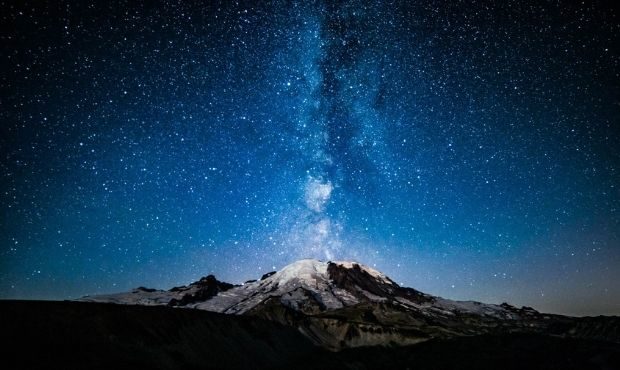‘Outer space is like the wild west’: Astronomers worry SpaceX satellites could change the night sky forever
May 20, 2021, 4:23 PM | Updated: 4:38 pm

The Milky Way and Mt. Rainier illuminated by the moon. Astrophotographers, like Seattle's Bryan Mills, seek out the darkest places on Earth to capture the galaxy. Some worry that satellite light pollution will eventually make photos like these impossible. (Photo by Bryan Mills, (Cascadia Obscura Photography))
(Photo by Bryan Mills, (Cascadia Obscura Photography)
A couple weeks ago I got a text: “Go up to your roof NOW!”
If you were outside around 9:30 p.m. on May 4, you may have seen a mysterious string of lights traveling through the night sky. The next day, The Seattle Times reported that it was one of 60 SpaceX Starlink satellites launched earlier that day.
“There are roughly 20,000 satellites tracked by the US government,” said James Lowenthal, professor of astronomy at Smith College. “That includes satellites that are operating, which is about 2,000, the satellites that are defunct, that’s another few thousand, and then many pieces of satellites that have been destroyed. Two satellites crash into each other and turn into 2,000. Plus, probably trillions of very small pieces, as small as a milometer, which cannot be tracked.”
Astronomers, like Professor Lowenthal, are quite concerned by the rapidly growing number of satellites. Not just because of the crowding and space garbage they’re creating, but because their lights could change the night sky as we know it forever.
“Many of those objects that are up there are reflecting sunlight back down to the Earth on the night side and they appear as streaks of light in the night sky,” said John Barentine, director of conservation for the International Dark Sky Association.
The streaks are ruining images astronomers capture for research and they are artificially brightening the night sky, making it more difficult to see things like stars and planets.
“You’re not immune no matter where you go on Earth,” Barentine said. “This is a completely different animal and you can’t just go further away from a city to get away from this effect.”
But the satellite operators aren’t doing anything illegal. There are currently no regulations that address who can put what into space.
“Outer space is kind of like the wild west in terms of how it is governed under international law,” Barentine said. “There is an international treaty called The Outer Space Treaty that was signed by the original members of the United Nations in the late 1960s. It has not really been updated since. It prohibits nuclear weapons in space and it really doesn’t envision private, commercial uses of space as we are seeing now. As long as we’re abiding by that treaty, operators can get away with pretty much anything.”
The satellite operators have to clear their launches with the FAA and the FCC, but there are no environmental impact studies required, and no limitations. So astronomers are pushing for regulations, a molasses slow process that will take years. Meanwhile, private companies like SpaceX are racing to own the near-Earth space.
“It’s everyone’s sky,” Lowenthal said. “Nobody has a right, especially a single corporation, in my view, to decide that it’s OK to change the sky for everybody. The sky is a piece of nature, the sky is like the trees or the forest, and this is not just a problem for professional astronomers, this is a problem that effects everybody. It would be like saying, well, this private industry is going to take away all the sunsets. Is that OK? I mean, sunsets aren’t worth anything, are they? Just because people look at them, nobody actually uses them.”
Why Seattle entrepreneurs are incorporating Mercury retrograde into their businesses
Aparna Venkatesan, professor of physics and astronomy at University of San Francisco, says there are cultural implications to consider. Indigenous people use the night sky for navigation and as a guide to planting. Several religions follow the moon and sky traditions. Lighting up the dark sky also disrupts the natural rhythms of animals and creatures.
“Given the history of westward expansion and colonization on Earth, it’s been painful that astronomers are now on the receiving end of what so many indigenous peoples were, which is a kind of ‘claim first, ask later,'” Venkatesan said.
Lowenthal says it’s ironic that the technology the satellites use is based on Newtonian physics.
“Newtonian physics is based on naked eye observations of the sky, made by Kepler, Copernicus, Tycho Brahe and thousands of years of astronomers before them, including indigenous peoples around the world — naked eye observations that led to our understanding of gravity and orbits. For the last hundred years, we’ve had ground-based telescopes doing the same thing, only at an accelerating pace, and looking further and further back into space and back into time to understand the basic workings of nature,” Lowenthal said.
“What is the universe made of? Is there life elsewhere on other planets? All of it is based fundamentally on ground-based astronomy and all of that is now threatened by the satellite technology that is enabled by those observations,” he continued. “We would not be able to launch those satellites if we didn’t know how gravity worked and if we hadn’t been able to build GPS, which depends on general relativity, which depended on observations of the cosmos. So we are in the middle of blinding ourselves to further study.”
SpaceX has been voluntarily meeting with astronomers for two years, and says it is working on dimming the lights on their satellites. But the company has no plans to stop launching. SpaceX did not reply to my request for comment.
Listen to Rachel Belle’s James Beard Award nominated podcast, “Your Last Meal,” featuring celebrities like Rainn Wilson and Greta Gerwig. Follow @yourlastmealpodcast on Instagram!













